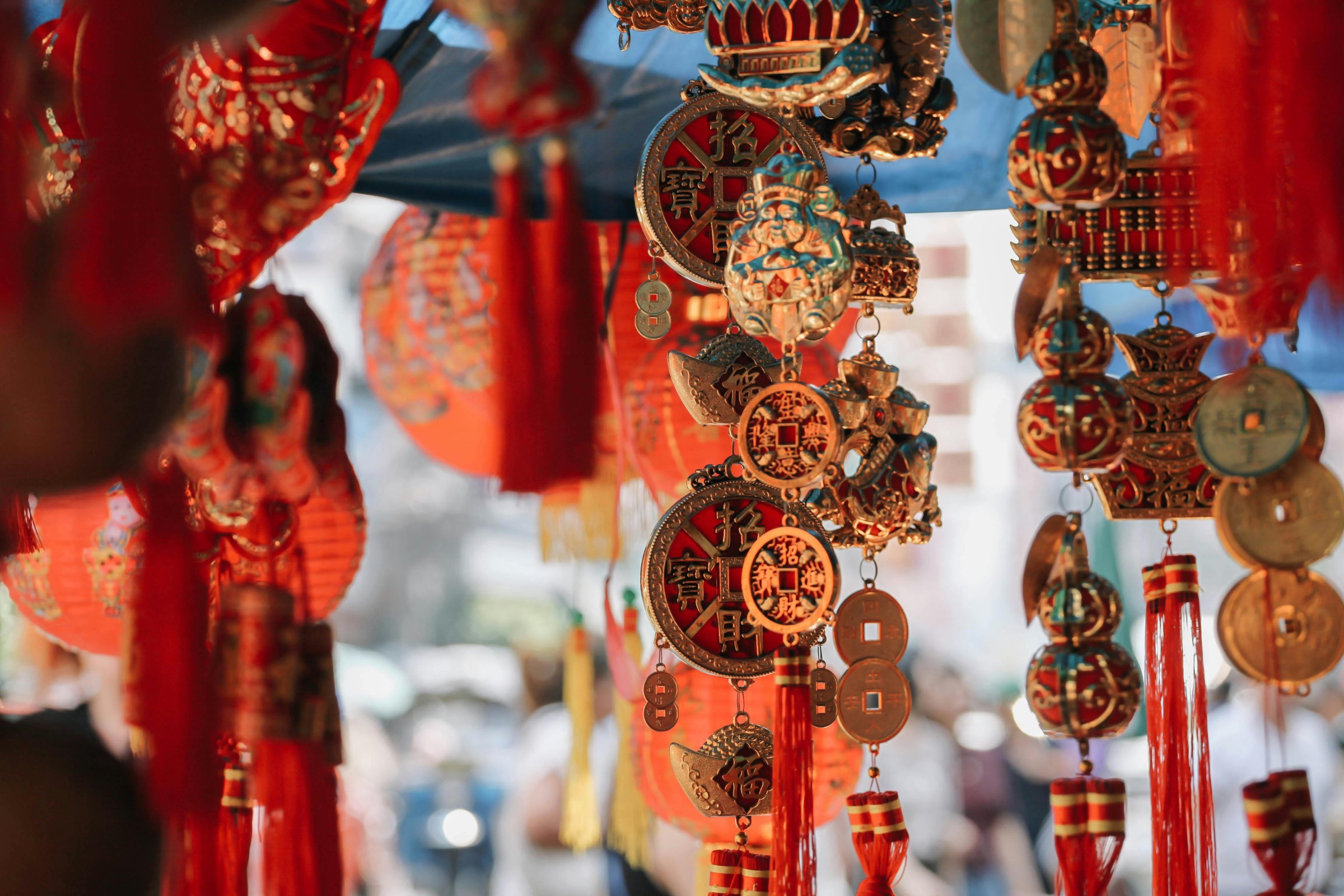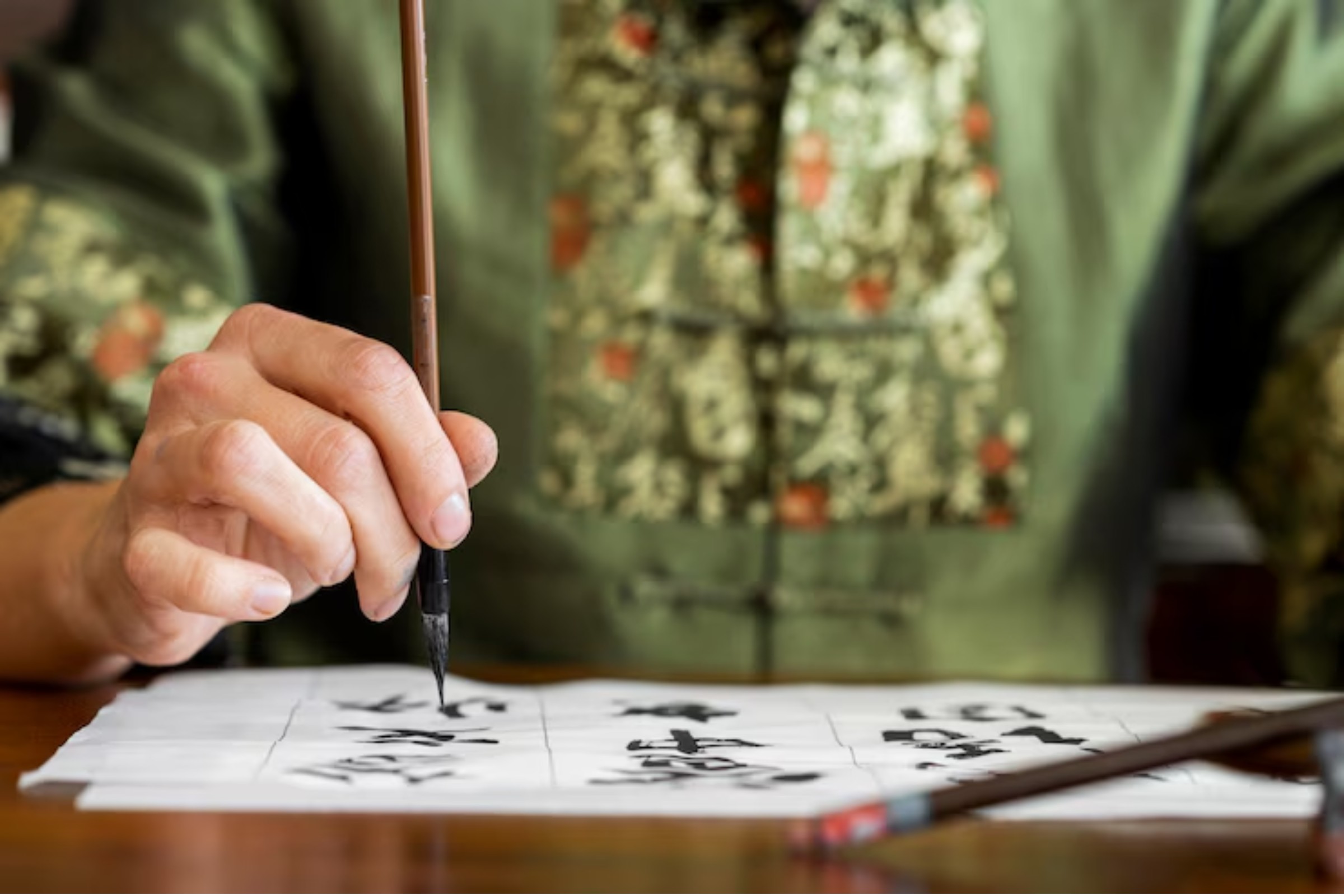Feng shui talisman is a term for symbolic objects or amulets used in Chinese tradition to influence the flow of qi (energy) and bring various forms of good fortune. These talismans come in many shapes and materials, each believed to attract specific kinds of luck or offer protection.
For example, the famous three-legged money toad (Chan Chu) is a Feng Shui talisman for wealth – it is placed to attract abundance and repel bad spirits. Likewise, a pair of guardian lions (Fu Dogs) at a doorway is a protective talisman, thought to ward off negative energy and misfortune.
In the sections below, we describe common types of Feng Shui talismans and the purposes they serve, from prosperity and love to health and protection.
Wealth and Prosperity Talismans

Money Toad (Chan Chu)
One of the most iconic Feng Shui talismans is the Money Toad (also called Jin Chan). This is a statue of a three-legged frog often depicted with a coin in its mouth. It is believed to attract wealth and abundance into a home or business.
The money toad is typically placed near the entrance, facing inward, to symbolise money coming in. Traditionally, tying a red ribbon or cloth around its body “activates” its power. As one source explains: “the three-legged money toad attracts wealth and abundance to a home. It also repels evil spirits”.
In modern practice, it’s often found on a homeowner’s desk or a wealth corner (southeast area) to boost financial luck.
Chinese Coins and Wealth Charms
Strings of old Chinese coins are another common wealth talisman. Three or six coins tied together with red ribbon are thought to create a “prosperity vibe.” When hung over a cash register, office desk, or near the front door, they symbolise ongoing wealth.
Similarly, figurines like the Dragon Turtle (a turtle with dragon features) combine two symbols of good fortune. The dragon turtle is reputed to bring career success and financial stability. Symbolically, it represents “courage, determination, and longevity, alongside the promise of prosperity”.
It is often placed in the home’s north or wealth sector. These talismans work by constant reminder of one’s goals and the intention to attract money energy.
Love and Relationship Talismans

Mandarin Ducks and Double Happiness
For matters of the heart, Feng Shui offers symbols of love and fidelity. A classic example is a pair of Mandarin Ducks. In Chinese lore, mandarin ducks mate for life, so their figurines represent romantic fidelity.
A pair of ceramic or crystal mandarin ducks placed in the bedroom is said to “strengthen bonds and attract love”. They encourage harmony and can “help in attracting a soulmate or keeping the flame alive” for couples.
Another symbol is the Double Happiness character, often seen on wedding gifts – it’s a talisman for marital bliss. Crystals also play a role: rose quartz, called the “Love Stone,” is a talisman to foster love and compassion. It is said to “purify and amplify love energies,” helping heal old wounds and making space for new relationships.
Lucky Charms for Joy
Objects like Laughing Buddha statues are believed to bring general good luck and contentment, which can indirectly benefit relationships by creating a joyful atmosphere. The Laughing Buddha is often called a talisman of happiness; a cheerful statue can uplift the mood of a room and “fill any space with good vibes”. Similarly, certain plants are also considered love-enhancers: pink peonies or a small bouquet of roses can be treated as living love charms.
Health and Longevity Talismans

Wu Lou (Health Gourd)
Health is traditionally symbolised by the Wu Lou, or Calabash gourd. In Chinese culture, the Wu Lou was historically used to carry herbal medicines, so in Feng Shui it acts as a health talisman. A brass or resin Wu Lou is often placed in a home or carried as a charm; it is believed to absorb negative energy and promote physical well-being. Carrying a small Wu Lou or displaying one in the bedroom is meant to protect one’s health and longevity.
Crane and Tortoise
Animals are also health symbols. The Crane is revered in Feng Shui as a symbol of longevity and peace. Often represented in art or sculptures, a crane is believed to bestow long life and serenity on its owner. Likewise, the tortoise or turtle is a talisman for a long, stable life. Feng Shui tortoise figurines (sometimes with coins on their back) are placed to attract good health and steady progress. For instance, one guide notes that the Feng Shui tortoise is “known for the good luck and harmony it brings to a family,” and it is often positioned in the far-left (wealth) corner to invite prosperity and well-being.
The dragon turtle – a composite talisman combining a dragon’s head and a turtle’s shell – symbolises wealth and longevity. In Feng Shui, placing this creature near the entryway or in a wealth corner is believed to bolster career prospects and invite abundance. Its image of determination and courage encourages success, while its turtle shell represents long life. Such animal talismans carry multiple meanings, reinforcing both material prosperity and family harmony.
Protection and Luck Talismans
Bagua Mirror and Fu Dogs
Some talismans are used primarily for protection. A classic protective talisman is the Bagua Mirror, a convex or concave mirror inscribed with the eight trigrams of Taoism. Hung outside above the main door (facing outwards), it is said to deflect negative energy away from the home. Feng Shui experts agree the Bagua mirror “provides protection against evil energy” and encourages positive energy flow.
Similarly, Fu Dogs (also called guardian lions) are powerful protective talismans. A pair of stone or ceramic lion statues at a doorway has long symbolised guardianship. These fierce-looking lions “possess powerful protective energy” and are thought to ward off evil spirits and harmful influences. The male and female lions are usually placed to flank an entrance, balancing yin and yang. If you place a Fu Dog inside or outside, they are said to bring both protection and prosperity. As one guide explains, they “protect and guard against negative energy… and are believed to bring good fortune, prosperity, and blessings”.
Wind Chimes and Crystals
Other objects like wind chimes serve a protective or luck-enhancing role. In Feng Shui, metal or bamboo wind chimes are hung to disrupt stagnant energy and signal the presence of incoming guests (both human and energetic). For example, hanging a chime near the front door can alert you to visitors and “increase energy flow in this vital ‘mouth of chi’”. Wind chimes often feature auspicious symbols: dragon designs for prosperity, turtle motifs for longevity, fish or coins for wealth. Each symbol adds its meaning – for instance, a chime with a turtle symbolizes long life and safety. Likewise, gemstones like ametyst or quartz hung as pendants can be personal talismans. They carry protective energy as well; amethyst is often seen as a calming, protective stone.
Symbols of Good Fortune
Many talismans are meant to enhance general luck or positive energy. The Lucky Cat (Maneki Neko) is a popular one, often displayed with its paw raised. In Feng Shui it is said to “attract good luck and wealth,” and is commonly placed near entrances or cash registers. Its raised left paw invites customers or relationships; the right paw is said to bring money. Keychains or pendants with Chinese characters (like Fu 福 for happiness, or Shou 寿 for longevity) are also used as personal amulets. Hanging a crystal lotus or mandarins for good fortune is another practice. Essentially, any object that is culturally associated with luck (even a red ribbon, knot, or hanging amulet) can function as a Feng Shui talisman if placed and used with positive intent.
Practical Use of Talismans

While Feng Shui talismans are steeped in tradition, their effectiveness is thought to depend on respectful use. They should be placed mindfully and cleansed of negative associations. For example, avoid placing wealth symbols (coins, money frog) in bathrooms or bedrooms, which are considered to “flush away” money luck. Always face statues of deities or guardians inwards towards the home so they invite or protect, rather than facing the wall. Traditional Feng Shui advises updating talismans occasionally and honouring them (for instance, the Money Frog with fresh coins). In short, a talisman is most auspicious when it is handled with care and a clear positive intention.
Have a question for us?
We welcome any question with no commitments. Master Louis Cheung will seek to clarify any doubts you may have.
“Master Louis Cheung has an approachable and comfortable personality along with competent skills. I can confidently recommend Master Louis Cheung to my friends. Thank you, Feng Shui Master Louis Cheung.”
 James H.
James H.Senior Financial Analyst






